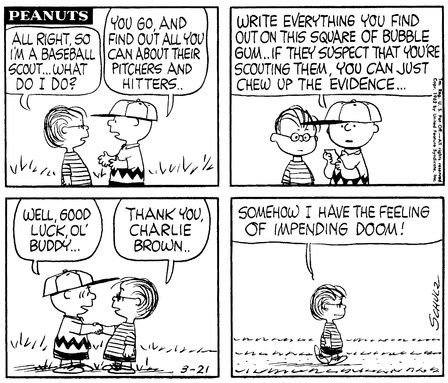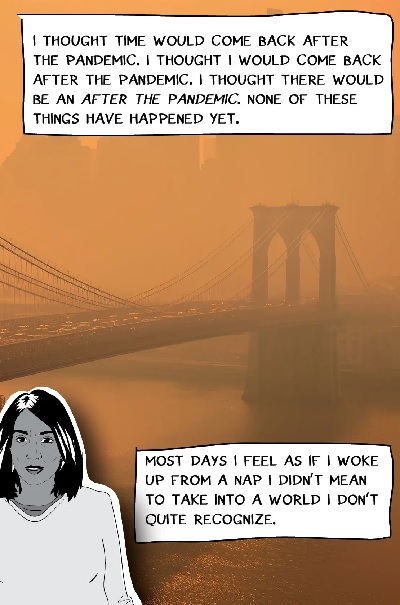as if woke from nap
didn’t mean to take, into world
don’t quite recognize
I grew up with comic books.
A lot of comic books.
Not the Marvel – Super Hero genre, but the Gold Key / Walt Disney comic books of Uncle Scrooge the Billionaire and Moby Duck the Whaler.
Comic books were community property in our house.
There was a built in cabinet along one wall of our family room and in the cabinet were three drawers and all the comic books got tossed in there to be read and re-read by all of us.
With their drawings and balloons of text or bubbles of text to show the text was just a thought, me and my brothers and sisters had no problems reading through the pages of dialogue.
With this in mind, I had no problems navigating the work of Mira Jacob’s OP-ART piece in the New York Times titled, Things I Thought Made Sense Just Don’t Anymore.
Her first panel has the text:
I thought time would come back after the pandemic. I thought I would come back after the pandemic. I thought there would be an AFTER THE PANDMEIC. None of these things have happened yet.
Most days I feel as if I woke from a nap I didn’t mean to take into a world I don’t quite recognize.
Boy howdy but BOY HOWDY do I get it.
Most days I feel as if I woke from a nap I didn’t mean to take into a world I don’t quite recognize.
I thought about that line.
Most days I feel as if I woke from a nap I didn’t mean to take into a world I don’t quite recognize.
I am a champion napper.
I like to say I want napping to be in the Olympics and I am in training to win the gold medal.
I used to be able to take a 15 minute nap.
No matter where and no matter when, I could close my eyes and be asleep and wake up, without fail, in 15 minutes.
Wake up and be ready to go.
Of late, those naps are lasting about 20 to 25 to 30 minutes.
I wake up feeling muzzy (is there a better example of onomatopoeia than muzzy?).
I wake up sometimes in a world I don’t quite recognize.
Then I come back around.
But …
I am reminded of the story of Rip Van Winkle who feel asleep and woke up 20 years later.
Washington Irving wrote that back in 1819.
Not sure but pretty sure there wasn’t a pandemic back in 1819 but something had to motivate Mr. Irving.
Looking for an answer I dove into Wikipedia to learn that the storyline of napping and waking up in a world the hero doesn’t quite recognize goes way back in history.
Along with Mr. Van Winkle there is Honi HaMe’agel, the Seven Sleepers of Ephesus, Uzair Epimenides of Knossos, Peter Klaus, Ranka and a feller named Urashima Tarō.
According to Wikipedia, “Multiple sources have identified the story of Epimenides as the earliest known variant of the “Rip Van Winkle” fairy tale.”
That was back in the 3rd Century AD.
All through the sad and sorry history of this world, there are writers who feel displaced and give voice to their feelings in fables and stories about people who feel as if they woke from a nap they didn’t mean to take into a world they don’t quite recognize.
I sure feel that way today.
Much like Justice Oliver Wendall Holmes who at age 92, feel asleep during an argument in the United States Supreme Court.
When nudged by the Justice next to him, Justice Holmes is reported to opened his eyes and yelled, “Jesus Christ! Where the hell am I?”
Lucky for me I still pick up my tablet in the morning to read my Bible.
This morning I read, “I consider that our present sufferings are not worth comparing with the glory that will be revealed in us.” (Romans 8:18 NIV)
Our present sufferings are not worth comparing with the glory that will be revealed in us.
In his Hornblower series of novels, CS Forester describes how our hero, Horatio Hornblower, is taking his oral examination for promotion to Lieutenant and is about to fail when the proceedings are broken up by an enemy attack.
When things settle down, young Hornblower askes one of his Officers who made up the examining board about his possible promotion.
The Officer askes Hornblower if he remembers that he was about to be failed when the attack ended the exam.
The Officer looks at Hornblower and says, “Then be thankful for small mercies. And even more thankful for big ones.”
I will remember that our present sufferings are not worth comparing with the glory that will be revealed in us.
And I will be thankful for small mercies.
And even more thankful for big ones.

